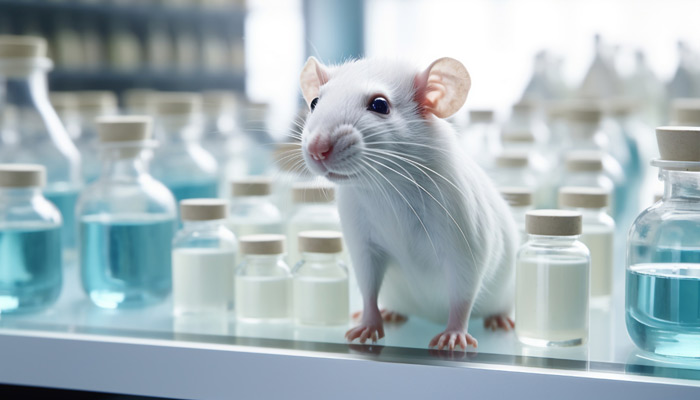
New Laws, New Science: The Shift Toward Ending Animal Testing in Research
Advanced testing alternatives aim to improve outcomes and reduce the burden on our fluffy friends.
On September 15, 2024, Senators Cory Booker, Eric Schmitt, Rand Paul and several bipartisan colleagues introduced the FDA Modernization Act 3.0—a direct follow-up to the landmark FDA Modernization Act 2.0 signed into law in 2022. The new bill is designed to push the FDA to implement long-overdue changes that were meant to update the drug testing process, allowing for non-animal alternatives such as cell-based assays, organ chips and computer modeling to replace traditional animal models.
The FDA Modernization Act 3.0 aims to accelerate the shift toward humane, scientifically advanced alternatives to animal testing. This legislation could revolutionize drug development, cutting costs and improving human trial outcomes, all while reducing the reliance on outdated animal models.
This move comes after widespread frustration that despite the passing of the 2022 law, the FDA has not yet updated its regulations to align with this modern approach [1].
The FDA Modernization Act 2.0 was passed to address inefficiencies in drug testing, particularly the reliance on animal models. For decades, preclinical animal testing was required to demonstrate safety before human trials could begin. However, research shows that 90-95% of drugs that pass animal tests fail in human trials [2] [3].
This is not only a significant waste of time and resources, but also a barrier to developing effective treatments. Proponents of the new legislation, such as Dr. Aliasger Salem from the University of Iowa, emphasize the limitations of animal models. He notes, “The challenge is that these animal models often do not replicate human biology accurately,” leading to costly failures once human trials begin [4].
Companies like Emulate, which is developing organ-on-a-chip technology from the Wyss Institute at Harvard University, are working to change this. Their platforms simulate human organs in vitro, allowing scientists to test drug responses on human cells, thus providing more predictive results than animal models ever could. The company’s work on COVID-19 drug testing has already demonstrated how these models can be used to assess human immune responses.
The FDA has acknowledged these technologies as valuable alternatives, but widespread adoption has been hindered by regulatory delays.
The ethical dimensions of animal testing are also a driving force behind this legislative push. According to People for the Ethical Treatment of Animals, millions of animals are subjected to testing each year in the U.S., often enduring severe pain and distress [5].
Naomi Charalambakis from the Federation of American Societies for Experimental Biology sums up the broader sentiment within the scientific community: “The goal is to eventually try to replace animals entirely,” but this will require more research and development of these alternative technologies.
Beyond the ethical and scientific realms, there are also significant economic benefits to reducing reliance on animal models. The introduction of organ chips and other advanced testing methods can cut development costs by minimizing failed trials and accelerating the drug approval process [6].
However, as Paul Locke, a professor at Johns Hopkins University, points out, “These alternatives are still in their early stages, and more research is needed before they can fully replace animal models.” The FDA Modernization Act 3.0 aims to expedite this transition, ensuring that companies can use human-relevant models as soon as they are validated [1].
While the bill’s proponents are optimistic about the future of non-animal testing, the transition is not without its challenges. Animal models are still viewed by many as a necessary component for certain complex physiological studies—especially in areas like cancer research and neurological diseases, where no adequate alternative yet exists. The National Association for Biomedical Research [3] continues to argue that animal testing remains crucial for understanding the intricate biological systems involved in drug metabolism and side effects.
The ripple effects of this legislation could reshape the entire clinical testing regime. As more companies adopt these new testing methods, regulatory pathways will need to evolve to ensure these alternatives meet safety standards for human trials. Additionally, this change could lead to faster and more efficient drug development cycles, potentially improving patient outcomes by bringing safer drugs to market more quickly.
The FDA Modernization Act 3.0 aims to break down long-standing barriers in the drug testing process by fully implementing the provisions of its predecessor. With a focus on more accurate, humane and economically efficient drug development, this legislation could transform how new treatments are brought to market. However, the path forward requires balancing the scientific realities of animal testing with the promise of new technologies, as well as a concerted push from both the government and the scientific community to embrace this paradigm shift.
Cited:
[1] Center for a Humane Economy: https://centerforahumaneeconomy.org/2024/09/12/legislation-demands-fda-implement-regulations-to-wind-down-inaccurate-animal-testing
[2] Introduction of FDA Modernization Act 3.0: https://www.schmitt.senate.gov/media/press-releases/schmitt-booker-paul-king-braun-whitehouse-introduce-the-fda-modernization-act-3-0/
[3] National Association of Biomedical Research press release: https://www.nabr.org/about-nabr/news/nabrs-press-statement-fda-modernization-act-20
[4] Verywell Health, “FDA: New Drugs Don’t Need Animal Testing Before Human Trials”: https://www.verywellhealth.com/animal-testing-no-longer-required-before-human-trials-7096981
[5] People for the Ethical Treatment of Animals, “Facts and Statistics About Animal Testing,” https://www.peta.org/issues/animals-used-for-experimentation/animals-used-experimentation-factsheets/animal-experiments-overview/
[6] American Veterinary Medical Association, “New Law Clarifies Alternatives to Animal Testing for Safety, Efficacy of Drugs:” https://www.avma.org/news/new-law-clarifies-alternatives-animal-testing-safety-efficacy-drugs





